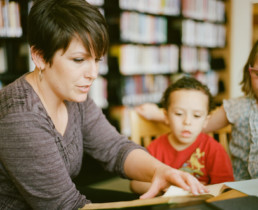Educational Innovation
Network Key Community
Members
Viladecans’ 360º approach to education underpins the idea of an Educational Innovation Network that involves different public and private representatives in a city-wide project. Anybody educates, anywhere at any time. It is understood that learning happens within and out of schools’ walls, and also physically and, increasingly, from and with virtual digital tools.
This education conception makes everybody co-responsible in the teaching-learning process. Bridges between potentially education agents, formal and non-formal, promote collaborative efforts and have a multiplying impact.
With this in view, all ON BOARD partners engaged members from different stakeholders’ groups to participate in the international gatherings, their local planning meetings and in pilot innovative projects.
Teachers and headmasters were obviously the first ones, but other followed: local businesses and the university, entities of all kinds, families, the students themselves… they turned to have a high potential and interest in connecting with each other to improve students’ interest, skills and capacities from a “real world” standpoint and beyond the formal curricula.
Families engagement
for educational
success
In Viladecans’ schools, parents of the students participate in aspects and decisions of daily school life, for example, the catering service for the school canteen or the after-school activities that take place in the centre, such as sports and leisure. Teachers are used to organise celebrations together with parents and students. This has proved to create collaborative bonds that contribute to strengthening and prestige the centre and its teachers, and to develop a sense of pride and belonging.
Not all ON BOARD cities have the same integration and parental involvement in school life. For some ON BOARD cities teacher-family dialogue is very limited. Most ON BOARD Cities have Families’ Associations or Parents’ Councils, with a diverse capacity of decision and involvement in each city.
In the meeting the Poznan held, families’ representatives were invited to contribute their own insights on the interest and capacity to collaborate with the school.
Some highlights on the parent’s insights and further debate concluded that families see a special interest in expanding their role of supporting their own kids with homework and duties and bridge between the school and their work and life out of the school. They see themselves as active members offering their own knowledge, skills and contacts to enrich and support education and the community.

Voices
NM_51
NM_52
NM_53
NM_54
NM_55
The content of the Website reflects only the authors view. The Managing Authority and the European Comission are not liable for any use that may be made of the information it contains.

